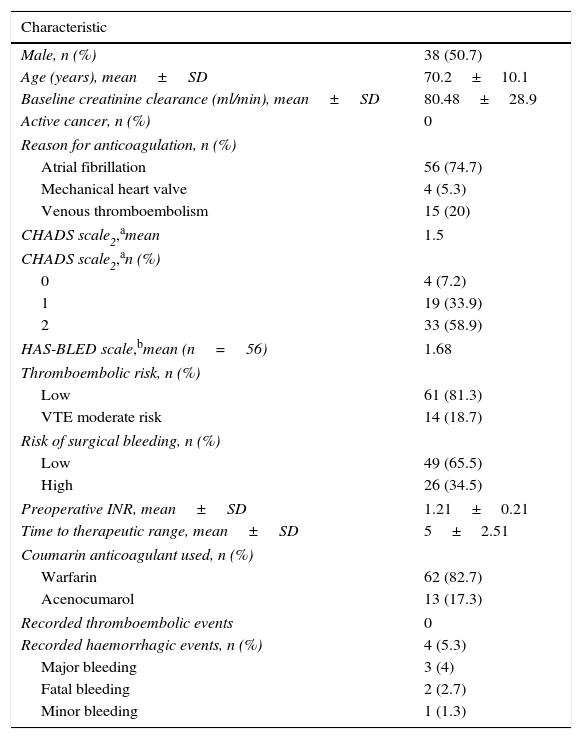To quantify thromboembolic and bleeding events in patients with low thromboembolic risk, who were chronically receiving vitamin K antagonists and undergoing elective surgery.
Material and methodsA descriptive, prospective, single-centre study was conducted between December 2010 and July 2014. Patients aged over 18 years old, chronically anticoagulated with vitamin K antagonists and admitted for elective surgery were included in the study. We excluded patients with a creatinine clearance <30ml/min, a body weight >120kg, heparin-induced thrombocytopenia, pregnant women, carriers of an epidural catheter for analgesia, patients who underwent unscheduled surgery and high thromboembolic risk-patients. Vitamin K antagonists were discontinued 5 days prior to the procedure without administering anticoagulant enoxaparin. The NIR was measured 24h before the procedure. A single dose of 3mg of vitamin K was administered in cases of a NIR>1.5. Vitamin K antagonists was resumed according to the surgical bleeding risk. Events were registered between 5 days prior to the procedure until 30 days after it.
ResultsA total of 75 procedures were included in the study. Fifty-six patients (74.7%) received vitamin K antagonists for atrial fibrillation, 15 suffered from venous thromboembolism (20%) and 4 had mechanical heart valves (5.3%). Twenty-six patients (34.5%) underwent high-bleeding risk surgeries and 49 (65.5%) underwent low risk procedures. No thromboembolic event was recorded. Four bleeding events (5.3%) were reported, 3 of which were considered major bleeding events (2 fatal).
ConclusionsSuspending vitamin K antagonists with no bridging therapy performed in patients with a low thromboembolic risk does not expose such patients to a significant risk of embolic events.
Se cuantificó la ocurrencia de episodios hemorrágicos y tromboembólicos en pacientes anticoagulados con antagonistas de vitamina K con bajo riesgo de tromboembolia, sometidos a un procedimiento invasivo electivo.
Material y métodosSe realizó un estudio descriptivo, prospectivo, unicéntrico entre diciembre de 2010 y julio de 2014. Se incluyeron pacientes mayores de 18 años, anticoagulados crónicamente con cumarínicos que ingresaron para realizar cirugía electiva. Se excluyeron los pacientes con aclaramiento de creatinina<30ml/min, peso>120kg, trombocitopenia inducida por heparina, embarazadas, catéter peridural para analgesia, cirugías no programadas y aquellos con alto riesgo tromboembólico. Se suspendió el antagonista de vitamina K 5 días antes del procedimiento sin administrar enoxaparina anticoagulante. Se midió RIN 24h antes del procedimiento y se administraron 3mg de vitamina K si este era mayor de 1,5. En el postoperatorio se reinició cumarínico según el riesgo de hemorragia asociado al procedimiento quirúrgico. Se evaluaron los episodios embólicos y hemorrágicos ocurridos desde el día 5 anterior al procedimiento hasta 30 días después de este.
ResultadosSe registraron 75 procedimientos. En 56 casos (74,7%) los pacientes estaban anticoagulados por fibrilación auricular, 15 por tromboembolismo venoso (20%) y 4 por válvula cardíaca mecánica (5,3%). Veintiséis pacientes (34,5%) se sometieron a cirugías de alto riesgo de hemorragia y 49 (65,5%) de bajo riesgo. No se registró ningún episodio tromboembólico y acontecieron 4 (5,3%) episodios hemorrágicos; 3 (4%) correspondieron a hemorragias mayores (2, mortales).
ConclusionesSuspender la anticoagulación con cumarínicos sin tratamiento puente en pacientes de bajo riesgo de tromboembolia no expondría a estos a la ocurrencia de episodios embólicos.









